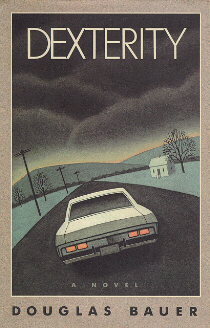
| NYWI HOME PAGE | VISITING WRITERS & EVENTS INDEX | VIDEO ARCHIVES |
Douglas Bauer
Writer-in-Residence, Writing the Short Story Workshop, Spring 1999
Douglas Bauer is a novelist and journalist who received his doctorate in English from the University at Albany. His first novel, Dexterity (1989), received high praise for its depiction of a marriage gone bad in a run-down hamlet in upstate New York. The New York Times reviewer asserted, "The genius of Dexterity is that it is scrupulously organized and yet seamless in its narrative structure. . .Mr. Bauer is himself extremely dexterous." His second novel, The Very Air (1993), tells the tale of a medical conman who sells implants of baboon gonads to impotent men in the Twenties and Thirties. Kirkus Reviews called it "An imaginative lark in the Doctorow vein. . .rough and tumble fiction that exults in its inventiveness."
 |
Bauer's most recent novel, The Book of Famous Iowans (1997), is a man's elegy to his vanished boyhood, and an attempt to piece together the events that caused the break-up of his mother and father. Set in a small farming community in Iowa in the Fifties, the novel examines the unfulfilled hopes of ordinary people in America's heartland. As in all the author's work, period detail is brought convincingly and movingly to life.
Bauer is also a free-lance journalist whose articles, essays and criticisms have appeared in Esquire, Harper's, Sports Illustrated, The New York Times Magazine, The Atlantic Monthly, and The New York Times Book Review. He received his doctorate in English from the University at Albany in 1983, and taught subsequently at Harvard and Ohio State. His first book, Prairie City, Iowa (1979), is a nonfictional portrait of the town where he was raised.
Douglas Bauer lives in Boston with his wife and stepson.
 |
In Dexterity, he gives us the lives of Ed and Ramona in the upstate mill town of Myles, New York. And what lives theirs are, filled in similar and separate ways with fierce eroticism and inevitable violence, with a constant undersong of black humor, and always with extraordinary tenacity. Ed and Ramona were high school lovers who married young, and while Ramona can vividly recall why she was drawn to Ed ("...when she was sixteen and spring-white in the season's first warm days, floating on a private pillowed lust..."), she has come to see him now as the incarnation of the narrow, rigid life of Myles, a forlorn little village in the Catskill foothills, two hours up the Hudson and several cultures away from midtown Manhattan. For his part, Ed knew in the bluntly visceral way he knows most things that he wanted Ramona--because she adored him; and he loved being adored. While others in Myles feared or respected him, no one else had ever regarded him as Ramona did and, for Ed, "receiving her worship was like receiving an exact reflection of what he thought of himself... not surprisingly, he grew hungrily fond of what she gave him." So that when Ramona, seeing the ever clearer reality of life with Ed in Myles, turns one hot, bright morning and--in a brief, freeing, almost hallucinatory moment--walks away from her house, from her life, and from her small baby boy, Ed is stunned into a depth of uncomprehending rage.
From here the story examines the consequences of Ramona's act on both their lives, as she moves furtively through the countryside and among the small towns upstate, fueled by a complicated and contradictory mix of fear, illicit exhilaration, and a steady guilt. She finds, along the way, that she possesses a cunning she didn't know she had, as she lives a life of necessary guile, always with the notion that she might have to flee again, and always, too, with a kind of amazed sorrow that she has left her son. How could I have done that? she asks herself again and again, from within the firm certainty that she mustn't go back.
But if Ramona's mind whirls with complexity, Ed's obsessively focuses, as his life in Myles comes precipitously undone, on one incantatory notion: that he must find Ramona; that he must bring her back. And so, after finally letting go of the idea that she will return on her own, he meticulously prepares to set out in search of her. With a deer hunter's patience and a maniacal precision extreme even for him, he gathers what he needs and, in the dark of early winter, leaves Myles to find his wife.
In the end, Ramona and Ed's stories fuse in a remarkable conclusion of both sadness and affirmation. But, haunting as its end is, we are held from the opening lines of Douglas Bauer's compelling narrative, held by its splendid grimness, by the powerful lure of the tale, as we follow Ed and Ramona, who form, as William Kennedy has said, "one of the oddest"--and most unforgettable--"couples in modern literature."
"Here is an extraordinary writer. The story of Ed and Ramona, one of the oddest couples in modern literature, is endlessly surprising . Douglas Bauer is a champion of the language, as any reader will quickly discover, has a great ear for vernacular, but most important of all, has an extraordinary talent for penetrating into the souls of his characters. He is masterful with the nuance. In an age when minimalism is in vogue, he tells his story with a density that we associate with Henry James. I am convinced that Dexterity is a great and original book." - William Kennedy
". . .here is a true grain of American life, pathos but also comedy and stoicism." - Sven Birkerts
"Dexterity abounds with skein upon skein of brilliant prose. . .It's a most impressive debut." - Howard Frank Mosher, Washington Post Book World
For additional information, contact the Writers Institute at 518-442-5620 or online at https://www.albany.edu/writers-inst.